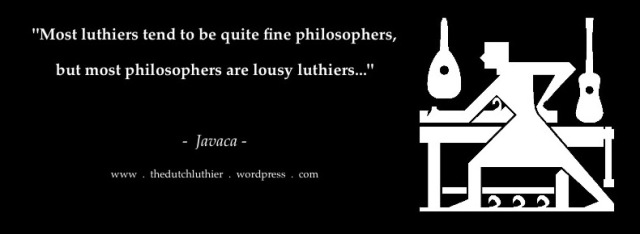A lot of people said to me that I tend to get a bit philosophic on this blog.
There is a simple reason for this:
Philosophy is nothing more than a great love for knowledge. The word is even made up out of the ancient Greek words for wisdom or knowledge “Sophia” and “Philia“, meaning (brotherly) love or friendship. And this isn’t only abstract, but also practical knowledge.
Like the recently passed Dutch “Philosopher Laureate” René Gude wrote in his book “Ik blijf nog even kletsen” (I’ll stay and talk for a short while):
“Since 500 B.C. “Sophia” is
the collective noun for all knowledge:
I name artisanal craftsmanship
but also the insight in day-to-day issues,
especially when they involve politics.When you put ‘philo’ in front of that,
it shows that you value that knowledge.Wherether it involves a slight interest
or being entirely submerged in the subject.Only people who really despise expertise, political insight or other intelligent skills are no philosophers.”
– René Gude –
To me craftsmanship and knowledge can’t go without each other. Knowledge is based on practice and practice is based on knowledge. They have a symbiotic relationship, one can’t exist without the other. When we break up these fields as two serperate entities they both suffer.
In our western society we try to make a split between these. Ever since Descartes we have acknowledged a split between soul and body, mind and matter. And we value the world of the mind over the material world. Or maybe this started before Descartes, because st. Paul already describes this split when he lays the outlines of Christianity in his letters. We have to value our spiritual life over worldly matters.
And we see this in practice in our education system, as we value the humanities over the arts. Sometimes it seems that the only goal of our system of education is to produce university professors. Nice people, but a lot of them seem to live only in their head, in the vast and rich theoretical world of their mind. Their body is only used as a means of transport for their head. They use their hands only to write or type papers and leaf trough books.
And I love intellectuals, but they are just another form of life, not necessarily the apex of civilisation. Just like the people who only work with their hands and don’t care for anything more. Mostly because they were learned not to. As I said before, here in the Netherlands working with your hands has a bad taste. When you’re not very smart, you have to learn to work with your hands. And when you are smart you learn to work with your head; to rule over those who don’t have the intellectual fortune to sit in a comfortable chair. But the products of this system aren’t bad: they are horrible.
Managers who lack practical knowledge, but have to tell the people on the ground floor how to do their jobs. People working with their hands, who have no insight knowledge of what they do, and don’t really care because nobody cares.
In his wonderful book “The Craftsman” sociologist Richard Sennett writes that:
“[The] […]aim of this study is to explore what happens when
hand and head,
technique and science,
art and craft are separated.
I will show how the head then suffers;
both understanding and expression are impaired.”– Richard Sennett –
Is there a way out of this? Yes there is. But it goes right against the stream of our modern western society. It’s wider than you can capture in statistics, management structures and marketing plans. We need a renaissance of craftsmanship. People who are true ‘renaissancemen’ and -woman(!). A Homo Universale that builds bridges between various fields. To re-establish the bond between theory and practice, head and hands, technology and art!


More motivation to get that damned book done. Working on it now – thank you!
LikeLike